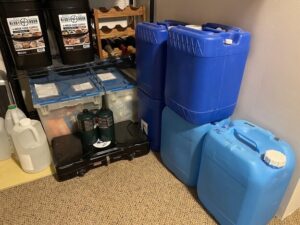Make it Easier on Yourself
We’ve written this before and will write it again: Simple disaster preparation makes sense.
A few days after Hurricane Beryl knocked out electricity for thousands of homes in the Houston area, we turned on the evening news. A reporter interviewed a family who had evacuated to an emergency shelter. Their home had not been damaged but they had no power.
“We could handle the heat but we had no food or water, so we came to the shelter,” one of the victims said.
How sad. Simple preparation could have made their lives easier. They wouldn’t have had to go to a shelter for food and water or to charge their phones.
We encourage everyone to store at least two weeks of food and water. By then the electric company is likely to have restored power. Remember, ATMs need electricity to work. Have some cash handy for emergencies.
Here’s what we keep on hand:
- 25 gallons of water in five five-gallon food-grade containers. Clean milk jugs work well for storing water. This is for drinking and cooking – not bathing.
- Sealed containers of food we bought from My Patriot Supply. It has a 25-year shelf life. These provide two weeks of food for the two of us. Many other companies sell long-term storage foods online.
- A moderate supply of canned and dried food, including flour, beans, rice, and nuts. A hand-operated can opener. We’re constantly using and replacing these foods but what we routinely have on hand would last at least a week. We keep minimal food in our freezer so a power loss wouldn’t greatly impact us.
- A camping stove and plenty of fuel that’s stored in the garage.

Keep supplies on hand.
None of these items needs electricity for storage. A power outage knocks out refrigerators, so any cold or frozen food is vulnerable. If our electricity went out, we’d eat these first before they spoil.
If the couple in Houston had stored a couple of weeks of food that doesn’t need refrigeration and a camp stove and fuel they could have stayed in their home until the power came back on. Having some nonperishable food and water in storage is a solid emergency strategy.

